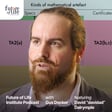Become a Creator today!Start creating today - Share your story with the world!
Start for free
00:00:00
00:00:01

Nuclear Dilemmas, From North Korea to Iran with Melissa Hanham and Dave Schmerler
With the U.S. pulling out of the Iran deal and canceling (and potentially un-canceling) the summit with North Korea, nuclear weapons have been front and center in the news this month. But will these disagreements lead to a world with even more nuclear weapons? And how did the recent nuclear situations with North Korea and Iran get so tense?
To learn more about the geopolitical issues surrounding North Korea’s and Iran’s nuclear situations, as well as to learn how nuclear programs in these countries are monitored, Ariel spoke with Melissa Hanham and Dave Schmerler on this month's podcast. Melissa and Dave are both nuclear weapons experts with the Center for Nonproliferation Studies at Middlebury Institute of International Studies, where they research weapons of mass destruction with a focus on North Korea. Topics discussed in this episode include:
the progression of North Korea's quest for nukes,
what happened and what’s next regarding the Iran deal,
how to use open-source data to monitor nuclear weapons testing, and
how younger generations can tackle nuclear risk.
In light of the on-again/off-again situation regarding the North Korea Summit, Melissa sent us a quote after the podcast was recorded, saying:
"Regardless of whether the summit in Singapore takes place, we all need to set expectations appropriately for disarmament. North Korea is not agreeing to give up nuclear weapons anytime soon. They are interested in a phased approach that will take more than a decade, multiple parties, new legal instruments, and new technical verification tools."
Transcript
Introduction to Nuclear Experts
00:00:08
Speaker
Hello, I am Arielle Kahn with the Future of Life Institute. This last month has been a rather big month concerning nuclear weapons. With the US pulling out of the Iran deal and the on-again, off-again summit with North Korea, I have personally been doing my best to keep up with the news, but I wanted to learn more about what's actually going on with these countries
00:00:30
Speaker
some of the history behind the nuclear weapons issues related to these countries, and just how big a risk nuclear programs in these countries could become. Today I have with me Melissa Hannam and Dave Schmerler, who are nuclear weapons experts with the Center for Non-Proliferation Studies at Middlebury Institute of International Studies.
00:00:54
Speaker
They both research weapons of mass destruction with a focus on North Korea. Melissa and Dave, thank you so much for joining us today. Yeah, thanks for having us. Thanks for having us on.
00:01:04
Speaker
All right, so I just said that you guys are both experts in North Korea, so naturally what I want to do is start with Iran.
What is the Iran Nuclear Deal?
00:01:10
Speaker
That has been the bigger news story, I guess, of the two countries this month because the US did just pull out of the Iran deal. Before we get any further, can you just, if it's possible, to briefly explain what was the Iran deal first? And then we'll get into other questions about it.
00:01:30
Speaker
Sure. So the Iran deal was an agreement made between the, it's formerly known as the JCPOA, and it was an agreement made between Iran and several countries around the world, including the European Union as well.
00:01:47
Speaker
And the goal was to freeze Iran's nuclear program before they achieved nuclear weapons while still allowing them civilian access to medical isotopes and power and so on. And at the same time, the agreement would be that the US and others would roll back sanctions on Iran. And the way that they verified that agreement was through
00:02:14
Speaker
a procurement channel, if needed onsite inspections, and regular reporting from Iran. As you mentioned, the U.S. is withdrawn from the Iran deal, which is really just they have violated the terms of the Iran deal. And Iran and European Union and others have said that they wish to continue in the JCPOA.
00:02:36
Speaker
If I've been reading correctly, the argument on the US side is that Iran wasn't holding up their side of the bargain. Was there actually any evidence for that?
00:02:48
Speaker
I think the American side for pulling out was more based on them lying about having a nuclear weapons program at one point in time leading up to the deal, which is kind of strange because that was the motivation for the deal in the first place was to stop them from continuing their nuclear weapons research and investment. So I'm not quite sure how to frame it outside of that.
00:03:13
Speaker
Yeah, Israeli President Netanyahu made this sort of presentation where he revealed all these different archive documents in Iran. And mostly what they indicated was that Iran had an ongoing nuclear weapons program before the JCPOA, which is what we knew, and that they were planning on executing that program. For people like me, I felt like that was the justification for the JCPOA in the first place.
00:03:44
Speaker
And so you both deal a lot with, at least most I know you deal a lot with monitoring, Dave, I believe you do too, with something like the Iran deal, if we had continued with
Challenges in Monitoring Iran's Missiles
00:03:53
Speaker
it. What is the process involved in making sure the weapons aren't being created? How do we monitor that?
00:04:01
Speaker
So it's a really difficult multi-layer technical and legal proposition. You have to get the parties involved to agree to the terms, and then you have to be able to technically and logistically implement the terms. And so in the Iran deal, there were some
00:04:21
Speaker
things that were included in some things that were not included not because it was not technically possible but because iran or the other parties would not agree to it so it's kind of a strange marriage between diplomacy and technology in order to execute these agreements.
00:04:38
Speaker
So one of the criticisms of the Iran deal was that missiles weren't included. So sure enough, Dave was monitoring many, many missile launches and our colleague Shay Cotton even made a database of North Korean missile launches. And Americans really hated that Iran was launching these missiles and we could see that they were happening. But the bottom line was they were not part of the JCPOA agreement. That agreement focused only on nuclear.
00:05:07
Speaker
And the reason it did was because Iran refused to include missiles or human rights and these other kinds of things.
00:05:15
Speaker
That's right. Negotiating Iran's missile program is a bit of another issue entirely. Iran's missile program began before their nuclear program did. It's accelerated. Development has corresponded to their own security concerns within the region.
Why Did North Korea Develop Nuclear Weapons?
00:05:31
Speaker
And they have, at the moment, a conventional ballistic missile force. So the Iranians look at that program as being a completely different issue.
00:05:39
Speaker
Just quickly, how do you monitor a missile test? What's involved in that? What do you look for? How can you tell they're happening? Is it really obvious, or is there some sort of secret data you access? A lot of the work that we do, most of the work that I shake up in Jeffrey Lewis and some other colleagues, is entirely based on information from the public. It's all open source research. So if you know what you're looking for, you can pull all the same information that we do from various sources of free information.
00:06:08
Speaker
The Iranians will often put propaganda or promo videos of their missile tests and launches as a way to demonstrate that they are becoming more sophisticated technologically modern ballistic missile producing nation. We also get reports from the US government that are published in new sources, whether from the US government themselves or from reporters who have connections or access to the inside.
00:06:30
Speaker
And we take all this information, and most will probably be able to speak to this a bit further, but we fuse it together with satellite imagery of known missile test locations. We'll reconstruct a much larger, more detailed chain of events as to what happened when Iran does missile testing.
00:06:47
Speaker
And I have to admit there's just more open source information available about missile tests because they're so spread out over large areas and they have very large sort of physical attributes to the sites. And of course, something lights up and ignites and then takes off into the air where everyone can see it. So monitoring a missile launch is easier than monitoring
00:07:13
Speaker
a specific facility in a larger network of facilities for a nuclear program. So now that Trump has pulled out of the Iran deal, what happens next with them?
00:07:25
Speaker
Well, I think it's probably a pretty bad sign. What I've heard from colleagues who work in or around the Trump administration is that confidence was extremely high on progress with North Korea. And so they felt that they didn't need the Iran deal anymore. And in part, the reason that they violated it was because they felt that they had so much already going in North Korea.
00:07:52
Speaker
And those hopes were really false. Like really, there was a huge gap between reality and those hopes. And it can be frustrating as an open source analyst who says these things all the time on Twitter or in reports that clearly nobody reads them. But no, things are not going well in North Korea. North Korea is not unilaterally giving over their nuclear weapons. And if anything, violating the Iran deal has made North Korea more suspicious of the US.
00:08:22
Speaker
I'm going to use that transition to North Korea here in just a minute, but I guess I hadn't realized that there was a connection between things seeming to go well in North Korea and the US pulling out of the Iran deal. You talk about hopes that the Iran deal is now unnecessary for North Korea, but what is the connection there? How does that work?
00:08:40
Speaker
Well, so the Iran deal represented diplomatic negotiation with an outcome among many parties that came to a kind of concrete result. It happened under the Obama administration, which I think is why there is
00:08:55
Speaker
some distaste for it under the Trump administration. But that doesn't matter to North Korea, that doesn't matter to other states. What matters is whether the United States appears to be able to follow through on a promise that may pass one administration to another.
00:09:12
Speaker
So the U.S. has in a way kind of violated some norms about diplomatic behavior by withdrawing from this agreement. And that's not to say that the U.S. hasn't done it before. I remember Clinton signing the, I think, Rome Treaty for the International Criminal Court, and then Bush un-signing it, never got ratified. But it's bad for our reputation. It makes us look like we're not
00:09:39
Speaker
using international law the way other countries expect us to. All right, so before we move officially to North Korea, is there anything else, Melissa and Dave, that either of you want to mention about Iran that you think is either important for people to know about that they don't
North Korea's First Nuclear Test
00:09:55
Speaker
already or that it's important to reiterate? No, I guess let's go to North Korea. That's our bread and butter.
00:10:02
Speaker
Okay, so North Korea has been in the news for a while now. Before we get to what's going on right now, I was hoping you could both talk a little bit about some of the background with North Korea and how we got to this point. North Korea was once part of the Non-Proliferation Treaty and they pulled out. Why were they in it in the first place? What prompted them to pull out? We'll go from there.
00:10:27
Speaker
Okay, I'll jump in. So North Korea withdrew from the NPT, or so it said. It's actually diplomatically very complex what they did. But North Korea either was or is a member of the Nuclear Nonpliferation Treaty, the NPT, depending on who you ask. And that is in large part because
00:10:51
Speaker
They were, and then they announced their withdrawal in 2003. And eventually, we no longer think of them as officially being a member of the NPT. But of course, there were some small gaps over the notification period that they gave in order to withdraw. And so I think my understanding is that some of the organizations involved actually keep a little North Korean nameplate for them.
00:11:19
Speaker
But no, we don't really think of them as being a member of an NPT or IAEA. So sadly, while that may not be legally settled, they're not abiding by traditional regimes or norms on this issue. And can you talk a little bit about, or do we know what prompted them to withdraw? Yeah, I think they really, really wanted nuclear weapons.
00:11:44
Speaker
I mean, I'm sorry to be glib about it. So yeah, they were seeking nuclear weapons since the 50s. The Kim Il-sung said he wanted nuclear weapons. He saw the power of the U.S.'s weapons that were dropped on Japan. The U.S. threatened North Korea during the Korean War with use of nuclear weapons. So yeah, they had physicists working on this issue for a long time.
00:12:09
Speaker
They joined the NPT. They wanted access to the peaceful uses of nuclear power. They were very duplicitous in their work. But no, they kept working towards nuclear weapons. And I think they reached a point where they probably thought that they had the technical capability and they were dissatisfied with the sort of norms and status as a pariah state. So yeah, they announced they were withdrawing and then they exploded something three years later.
00:12:36
Speaker
Now that they've had a program in place then, I guess for roughly 15 years then?
Technologies for Monitoring Nuclear Tests
00:12:42
Speaker
Oh my gosh, math. So I was sitting in Seoul. Dave, do you remember where you were when they had their first nuclear test? This was 2006. A long time ago. I think I was still in high school.
00:12:55
Speaker
I mean, this is a challenge to our whole field, right, is that there are generations passing through. And so there are people who remember 1945. I don't, but I'm not going to reveal my age. I was fresh out of grad school and working in Seoul when North Korea tested its first nuclear device. And, you know, it was
00:13:16
Speaker
sort of like cognitive dissonance around the world. I remember the shock of the response out of pretty much every country. I think China had a few minutes notice ahead of everybody else, but not much. And so, yes, we did see the reactor getting built.
00:13:33
Speaker
yes we did see activity happening at yangmyeon no we deeply misunderstood and underestimated north korea's capabilities so when that explosion happened it was surprising to people in the open source anyways.
00:13:51
Speaker
People scrambled i mean i was my first major gay that's why i still do this today was you know we had an office at the international crisis group of about six people and all our korean speakers were immediately sucked into other responsibilities and so it was up to me to try to take out all these little puzzle pieces.
00:14:12
Speaker
about the seismic information about the radionuclides that were actually leaked in that first explosion and figure out what a constant phoenix was and who was collecting what and put it all together to try to understand what kind of warhead that they may or may not have exploded if it was even a warhead by that point.
00:14:36
Speaker
I'm hoping that you can sort of explain how monitoring works. I'm an exorcismologist, so I actually do know a little bit about the seismic side of monitoring nuclear weapons testing, but I'm assuming a lot of listeners do not. And I'm not as familiar with things like the radionuclide testing, or the Phoenix that you mentioned was a new phrase for me as well.
00:14:56
Speaker
So I was hoping you could explain sort of what you go through to monitor and confirm whether or not a nuclear weapon has been tested. And before you do that real quick, so did you actually see that first? Could you see the explosion?
00:15:19
Speaker
No, I was in Seoul, so I was a long ways away and I didn't really, so of course I did not see or feel anything. I was in an office in downtown Seoul and so I remember actually how casual the citizens of Seoul were that day, so I remember feeling kind of nervous about the whole thing.
00:15:40
Speaker
I was registered with the canadian embassy in thole and we actually had when you registered with the embassy we had instructions on what to do in case of an emergency and i remember thinking like gosh wonder if this is an emergency you know i was young and fresh out of school.
00:15:55
Speaker
But no, I mean, as I looked down out of our office windows, sure enough at noon, the doors opened up and all my Korean colleagues streamed out to lunch together and really behaved pretty traditionally the way everyone normally does. South Koreans have always been very stoic about these tests, and I think they're taken more anxiously by foreigners like me.
00:16:18
Speaker
But I do also remember there were these aerial sirens going off that day, and I actually never got an explanation of why there were sirens going off that day. I remember they tested them when I lived there, but I'm not sure why the sirens were going off that day.
00:16:36
Speaker
Okay, let's go back to how the monitoring works. And Dave, I don't know if this is something that you can also jump in on. Yeah, sure. I think we'll just start and I'll try to fill in any gaps if there are any. So the Comprehensive Test Ban Treaty Organization is an organization based in Vienna. They have stations all over the world and they're continually monitoring for nuclear explosions.
00:17:03
Speaker
And the constant Phoenix is a WC-135. It's an U.S. Air Force vehicle. And so the information coming out of it is not open source and I don't get to see it. But what I can do or what journalists, investigative journalists sometimes do is say when it's taking off from Guam or Grenada Air Force Base. And then I know at least that the U.S. Air Force is
00:17:30
Speaker
thinking it's going to be sensing something. So this is a like a specialty vehicle. It's just, I mean, it's basically an airplane, but it has many, many interesting sensor arrays all over it that sniff the air. And what they're trying to detect are xenon isotopes.
00:17:47
Speaker
These are isotopes that are possibly released from an underground nuclear test, depending on how well the tunnel was sealed. So in that very first nuclear explosion in 2006, some noble gases were released, and I think that they were detected by the WC-135. I also remember back then, although this is a long time ago, that there were a few sensing stations in South Korea that detected them as well.
00:18:15
Speaker
So what I remember from that time is that the ratio of xenon isotopes was definitely telling us that this was a nuclear weapon. This wasn't like a big hoax that they had exploded a bunch of dynamite or something like that, which actually would be a really big hoax and hard to pull off.
00:18:31
Speaker
But we could see that it was a nuclear test, it was probably a fission device. The challenge with detecting these gases is that they decay very quickly. So we have, one, not always sensed radionuclides after North Korea's nuclear tests, and two, if we do sense them, sometimes they're decayed enough that we can't get anything more than it was a nuclear test and not a chemical test, chemical explosion test.
00:18:59
Speaker
Yeah, so what I might be able to offer because Melissa did a great job explaining how the process works is maybe a bit more of a recent mechanism and how we interact with these tests as they occur. So usually most of the people in our field follow a set number of seismic linked Twitter accounts that will give you updates on when some part of the world is shaking for some reason or another.
00:19:23
Speaker
No but i do you get an email update saying you know there's an earthquake in california cuz we get a place all the time or in japan then i'll send you here there's an earthquake in north ria never one kinda like. Pause is. See look at this tweet i guess or email you can also get sent your phone via text message to sign up for whichever region of the world you're interested in and you look for what problems what's the earthquake and if you registered in the right province okay.
00:19:52
Speaker
What's next is we'll look at the data that comes out immediately. The CTBTO will come out with information usually within a couple of days, if not immediately after. And we'll look at the seismic waves. And while I don't study these waves, the type of seismic signature you get from a nuclear explosion is like a fingerprint.
North Korea's Missile Advancements
00:20:09
Speaker
It's very unique and different from the type of seismic signature you get from an earthquake of varying degrees. And we'll take that and compare those to previous tests, which the United States and Russia have done.
00:20:20
Speaker
infinitely more than any other country in the world, and we'll see if those match. And as North Korea has tested more nuclear devices, the signatures started becoming more consistent. If that matches up, we'll have a soft confirmation that they did it, and then we'll wait for government news press releases to give us the final nail confirming that there was a nuclear test.
00:20:41
Speaker
Yeah, so as Dave said, as like a citizen scientist, I love just setting up the USGS alert. And then if there's an earthquake near the village of Pangiri, I'm like, aha, I got you, because it's not a very seismically active area. And when the earthquakes happen that are related to an underground nuclear test, they're shallow. They're not deep geological events.
00:21:04
Speaker
And yeah, there's some giveaways like people like to do them on the hour or the half hour and mother nature doesn't care. But some resources for your listeners if they want to get involved and see is you can go to the USGS website and set up your own alert.
00:21:20
Speaker
The CTBTO has not just seismic stations, but the radionuclide stations I mentioned, as well as infrasound and hydroacoustic and other types of facilities all over the world. And so there's a really cool map on their website where they show the over, I think it's nearly 300 stations all around the world now that are devoted exclusively to monitoring nuclear tests.
00:21:48
Speaker
They get their information out, I think, in seven minutes. And I don't get that information necessarily in the first seven minutes because I'm not a state member or a state party, but they will give out information very soon afterwards. And actually based on the seismic data, our colleagues, Jeffrey Lewis and some other young, smart people of the world, actually threw together a map
00:22:12
Speaker
not using CTBTO data, but using the seismic stations of, I think, Iran, China, Japan, South Korea. And so if you go to their website, it's called sleuthingfromtheinternet.com. You can set up little alerts there too, or scale for all the activities that are happening. And that was really just intended, I think, to
00:22:37
Speaker
be a little bit transparent with the seismic data and try to see data from different country stations. And in part, it was conceived because I think the USGS was deleting some of their explosions from the database and someone noticed. So now the idea is that you take a little bit of data from all these different countries and that you can compare it to each other.
00:23:02
Speaker
Then the last place I would suggest is to go to the IRIS seismic monitoring station, because just as Dave was mentioning, each seismic event has a different P-wave, and so it shows up differently, like a fingerprint. So when IRIS puts out information, you can very quickly see how the different explosions in North Korea compare to each other relatively, and so that can be really useful too.
00:23:31
Speaker
I will say though, sometimes you might get a false alarm. I believe it was with the last nuclear test. There was one reporting station or automatic alert system that was put up out of the UK that didn't report it. No one caught that it didn't. And then it did report it like a week later. So for like all of half an hour until we figured it out, there was a bit of a pause because there was some concern they might've done another test again, which
00:23:56
Speaker
a delayed reporting. So most of the time these things work out really well, but you always have to look for secondary and then third sources of confirmation when these types of events happen.
00:24:06
Speaker
So quick aside, we will have links to everything that you both just brought up in the transcript. So anyone interested in following up with any of these options will be able to. I'm also going to share a fun fact that I learned, and that was we originally had a global seismic network in order to monitor a nuclear weapons testing. That's why it was set up. And it's only because we set that up that we actually were able to prove the plate tectonics theory.
00:24:34
Speaker
Ah, cool. That's really cool. Yeah. No, the CTBTO is really interesting because even though the treaty isn't enforced yet, they have these amazing scientific resources and they've done all kinds of things. Like they can hear whales moving around with their hydro acoustic technology. And they, when Iran had an explosion, a major explosion at their solid motor missile facility, they detected that as well.
00:24:59
Speaker
Yeah, it's fun. I mean, like I said, I did seismology a while ago, so I'm signed up for lots of fun alerts. It's always fun to learn about where things are blowing up on the Earth's surface. Well, that's really like the magic of open source to me. So, I mean, it used to be that, you know, a government came out and said, OK, this is what happened and this is what we're going to do about it.
00:25:21
Speaker
The idea that me, like a regular person in the world, can actually look up this primary information in the moment that it happens and sort of make a determination for myself is really empowering. It makes me feel like I have the agency I want to have in understanding the world. And so I have to admit, like that day in South Korea, when I was sitting there in the office tower and it was like, okay,
00:25:48
Speaker
All hands on deck. Everyone's got to write a report. And I was trying to figure it out. I was like, I can't believe I'm doing this. I can't believe I can do this. This is such a different world already. Yeah, that is really amazing. I like your description. It's really empowering to know that we have access to this information.
00:26:04
Speaker
So I do want to move on and with access to this information, what do we know about what's going on in North Korea right now? What can you tell us about what their plans are? Do we think the summit will happen? I guess I haven't kept up with whatever the most recent news is. Do we think that they will actually do anything to get rid of their nuclear weapons?
00:26:25
Speaker
I think at this point the North Koreans feel really comfortable with the amount of information and progress they've made in their nuclear weapons
ICBM Capabilities and Future Tests
00:26:32
Speaker
program. That's why they're willing to talk. This program was primarily a means to create a security assurance for the North Koreans because the Americans and South Koreans have always been interested in regime change.
00:26:43
Speaker
removing North Korea from the equation trying to end the thing that started in the 1950s, the Korean War, right? And so there could be one Korea, we wouldn't have to worry about North Korea or this mysterious Herman Kingdom above the 30th parallel.
00:26:58
Speaker
With that said, there's been a lot of speculation as to why the North Koreans are willing to talk to us now. Some people have been floating around the idea that maximum pressure, I think that was the word used with sanctions and whatnot, has brought the North Koreans to their knees and now they're willing to give up their nukes, as we've been hearing about.
00:27:13
Speaker
But the way the North Koreans use denuclearization is very important, because on one hand, that could mean that they're willing to give up their nuclear weapons to denuclearize the state itself. But the way the North Koreans use it is much broader. It's more used in the way of denuclearizing the peninsula. It's not specifically reflective onto them.
00:27:32
Speaker
Now that they've finally achieved some type of reasonable success with their nuclear weapons program, they're more in a position where they think they can talk to the United States as equals and denuclearization falls into the terminology that is used by other nuclear weapons states where it's a, in a better world, we won't need these types of horrible weapons, but we don't live in that world today. So we will stand behind the effort to denuclearize, but not right now.
00:27:57
Speaker
Yeah, I think we can say that if we look at North Korea's capabilities first and then why they're talking now, we can see that in the time when Dave and I were cutting our teeth, they were really ramping up their nuclear and missile capabilities.
00:28:15
Speaker
And it wasn't immediately obvious because a lot of what was happening was inside a laboratory or inside a building. But then eventually they started doing nuclear tests and then they did more and more missile tests. And it used to be that a missile test was just a short-range missile off the coast.
00:28:32
Speaker
Sometimes it was sort of a political grandstanding. But if you look, our colleague Shay Cotton made a missile database that shows every North Korean missile test. And you can see that in the time under Kim Jong-un, those tests really started to ramp up. So I think Dave, you started at CNS in like 2014. Right around that.
00:28:56
Speaker
right around then. So they jumped up to like 19 missile tests that year. I can say this because I'm looking at the database right now. And they started doing really more interesting things than ever before too. So even though diplomatically and politically, we were still sort of thinking of them as being backwards, as not having a very good capability. If we looked at it quantitatively, we could say, well, they're really working on something.
00:29:20
Speaker
And so Dave actually was really excellent at geolocating when they did engine tests. We could measure the bell of the engine and get a sense of what those engines were about. We could see solid fuel motors being tested. And so this went all the way up until ICBM launched last fall, and then they were satisfied. So when you say engine testing, what does that mean? What engine?
00:29:49
Speaker
The North Korean ballistic missile fleet used to be entirely tied to this really old Soviet missile called the SCUD. If anyone's played video games in the late 90s or early 2000s, that was the small missile that you always had to take out or something along that line. And it was fairly primitive.
00:30:06
Speaker
it was a design that the north creams had demonstrated they were able to move beyond that's why when the last three years started to kick in the north creams started to feel more complicated missiles and start showing that they're doing engine tests with more experimental more advanced designs that we've seen in other parts of the world.
00:30:23
Speaker
Previously some people were a bit speculative for doubting that the North Koreans were actually making serious progress and then last year they tested their first intermediate range ballistic missile which can hit guang which is something that they've been trying to do for a while but it hadn't worked out and they made that missile larger they made the first ICBM.
00:30:41
Speaker
Then they made that missile even larger, came up with a much more ambitious engine design using two engines instead of one. They had a much more advanced steering system, and they came up with the Hwasam 15, which is their longest range ICBM. It's a huge shift from the way we were having this conversation five to 10 years ago, where we were looking at their space launch vehicles, which were, again, modified SCUTs that were stretched out and essentially tied together to an actual functioning ICBM fleet.
00:31:08
Speaker
So the technological shift in pair with their nuclear weapons developments really demonstrated that the North Koreans are no longer this 10 to 20 year around the corner threat that actually possess the ability to launch nuclear weapons at the United States.
00:31:23
Speaker
And back when they had their first nuclear test in 2006, people were like, it's a device. And I think for years, we still call it a device. But back then, the US and others kept sort of moving the goalposts. They were saying, well, all right, they had a nuclear device.
00:31:39
Speaker
explode. We don't know how big it was. They have no way of delivering it. We don't know what the yield was. It probably fizzled. It was very dismissive. And so from that period 2006 to today, it's a real remarkable challenge. Almost every criticism that North Korea has faced right down to their heat shield on their ICBM has been addressed
00:32:04
Speaker
vociferously with propaganda, photos and videos that we in turn can analyze. And yeah, I think they have demonstrated essentially that they can explode something. They can launch a missile that can carry something that can explode. The only thing they haven't done, and Dave can chime in here, is explode a nuclear weapon on the tip of a missile.
00:32:29
Speaker
And other countries have done this, and it's terrifying. And because Dave is such a geographically visual person, I'll let him describe what that might look like. But if we keep goading them, if we keep telling them they're backwards, eventually they're going to want to prove it.
00:32:49
Speaker
Yeah, so off of Melissa's point, this is something that I believe Jeffrey might have coined. It's called the Juche Bird, which is a playoff of a forget bird, which is a live nuclear warhead test that the Americans conducted. The North Koreans, in order to prove that the system in its entirety, the nuclear device, the missile, the reentry shield all work, and it's not just small random successes in different parts of a much larger program, is they would take a live nuclear weapon, put it on the end of a
00:33:15
Speaker
a long-range missile, launch it in the air, and detonate it at a specific location to show that they have the ability to actually use the purported weapons system. So if you're sitting in Japan or South Korea, but especially Japan, and you imagine North Korea launching an intermediate range or intercontinental
Risks of Nuclear Miscommunication
00:33:35
Speaker
ballistic missile over your country with a nuclear weapon on it in order to execute an atmospheric test, that makes you extremely nervous.
00:33:44
Speaker
extremely nervous and we all should be a little bit nervous because it's really hard for anyone in the open source and I would argue in an intelligence community to know, well, this is just an atmospheric test. This isn't the beginning of a war. We would have to trust that they pick up the trajectory of that missile really fast and determine that it's not heading anywhere.
00:34:06
Speaker
And that's the challenge with all of these missile tests is no one can tell if there's a warhead on it or not a warhead on it. And then we start playing games with ballistic missile defense and that is a whole new can of worms. What do you guys think is the risk that North Korea or any other country for that matter would intentionally launch a nuclear weapon at another country?
00:34:30
Speaker
For me, it's accident and an accident can unfold a couple of different ways. So one way would be perhaps the US is performing joint exercises.
00:34:41
Speaker
North Korea has some sensing equipment up on peaks of mountains, and Dave has found every single one probably. But it's not perfect, it's not great, and if the picture comes back to them, it's a little fuzzy, maybe this is no longer a joint exercise, this is the beginning of an attack, they will decide to engage. And they have long said that they believe that a war will start
00:35:05
Speaker
based on the pretext of a joint exercise. And in reverse scenario, what if North Korea does launch an ICBM with a nuclear warhead in order to perform a test and the US or Japan or South Korea think, well, this is it. This is the war.
00:35:22
Speaker
And so it's those accidental scenarios that I worry about, or even perhaps, you know, what happens if a test goes badly or, you know, there's some, someone is harmed in some way. I worry that these states would have a hard time politically rolling back where they feel they have to be based on these high stakes. Yeah. No, I agree with that Melissa.
00:35:46
Speaker
highest risk we have is also depending on our nuclear posture and accident. There have been accidents that have happened in the past where someone in a monitoring base picks up a bunch of bleeps on a radar and people start initiating the game on protocol. Luckily, we've been able to avoid that
00:36:05
Speaker
to its completion in the past. Now, with the North Koreans, this could also work in their direction as well. I can't imagine that their sensing technology is up to par with what the United States has or had back when these accidents were a real thing and they happened. So, if the North Koreans see a military exercise that they don't feel comfortable with or they have some type of technical glitch on their side, they might notionally launch something and that would be the start of a conflict. So, yeah.
00:36:32
Speaker
One of the final questions that I have for both of you. I've read that while nuclear weapons are scary, the greater threat with North Korea could actually be their conventional weapons. Could either of you speak to that?
00:36:44
Speaker
Yeah, sure. North Korea has a very large conventional army. Some people might try to make jokes about how modern that army is, but military force needs to be so modern with the type of geographical game that's at play on the Korean Peninsula. Seoul is really not that far from the DMZ, and it's a widely known fact that North Korea has tons of artillery pointed at Seoul, and they've had these things pointed there since the end of the
00:37:07
Speaker
in war and they're all entrenched. And you might be able to hit some of them, but you're not going to hit all of them. This type of artillery in connection with their conventional ballistic missile force, we were talking about things that aren't carrying a WMD. It's a real big threat for some type of a conventional action. And Seoul is a huge city, the metropolitan area at least, has a population of over 20 million people.
00:37:27
Speaker
I'm not sure if you've ever been to Seoul, it's a great beautiful city, but traffic is horrible and everyone's trying to leave the city when something happens. Everyone north of the river is kind of screwed and congestion on the south side, it would just be a total disaster outside of the whole nuclear aspect of this dangerous relationship that conventional forces North Korea has are equally as terrifying.
00:37:48
Speaker
And so I think Dave's bang on, but the only thing I would add is that one of the things that's concerning about having both nuclear and conventional forces is how you use your conventional forces with that extra nuclear guarantee. And so this is something that our boss Jeffrey Lewis has written about extensively, but do you use that extra measure of security and just preserve it, save it?
00:38:14
Speaker
And does Kim Jong-un go home at night to his family and say, yes, I feel extra safe today because I have my nuclear security? Or do you use that extra nuclear security in order to increase the number of propocations that you do conventionally? Because, you know, we've had these crises break out over the sinking of the Cheonan naval vessel or the shelling of Yankhando near the border.
00:38:40
Speaker
And in both cases, South Koreans died. But the question is, will North Korea feel emboldened by its nuclear security? And will it carry out more conventional provocations? OK. And so for the last question that I want to ask, we've talked about all these things that could go wrong. And there's really just never anything that positive about a nuclear weapons discussion. But I still want to end with, is there anything that gives you hope about this situation?
Hope for Future Nuclear Dialogues
00:39:09
Speaker
And that's a tough question. I mean, on one side, we have a nuclear armed North Korea, and this is something that we knew was coming for quite some time. I think, if anything, this is one thing that I know I have, and I believe Mosa has been advocating, as well as conversation and dialogue between North and all the other associated parties, including the United States, as a way to begin some type of line of communication, hopefully so that accidents don't happen.
00:39:36
Speaker
because North Korea is not going to be giving up their nukes anytime soon, even though the talks that you may be having aren't going to be as productive as you would want them to be. I believe conversation is critical at this moment because the other alternatives are pretty bad.
00:39:52
Speaker
I guess I'll add on that we have Dave now. And I know it sounds like I'm teasing my colleague, but it's true. Things are bad. Things are bad. But we are turning out generation after generation of young, brilliant, enthusiastic people.
00:40:08
Speaker
So you know before twenty fourteen we didn't have a dave and now we have a dave and dave is making more dave and every year we're matriculating students who care about this issue who are finding new ways to engage with this issue that are disrupting entrenched thinking on this issue.
00:40:29
Speaker
A nuclear weapons are old they are scary they are the biggest explosion that humans have ever made but they are physical and finite and the technology is aging and i do think with new creative engaging ways the next generation is gonna come along and they're going to be able to address this issue with new.
00:40:52
Speaker
hacks. And these can be technical hacks. These can be along the side of verification and trust building. These can be diplomatic hacks. The grassroots movements we see all around the world that are taking place to ban nuclear weapons, those are largely motivated by young people. And so I'm on this bridge where I get to see, I remember the Berlin Wall coming down
00:41:16
Speaker
And I also get to see the students who don't remember 9-11. And it's a kind of a nice vantage point to be able to see how history is changing. And while it feels very scary and dark in this moment, in this administration, we've been in dark administrations before. We've faced much more terrifying adversaries than North Korea. And I think it's
00:41:43
Speaker
Yeah, it's going to be our generations ahead who are going to help crack this problem. Excellent. That was a really wonderful answer. Thank you. Well, thank you both so much for being here today. I've really enjoyed talking with you. Thanks for having us. Yeah, thanks for having us on.
00:42:03
Speaker
For listeners, as I mentioned earlier, we will have links to anything we discussed on the podcast in the transcript of the podcast, which you can find from the homepage of the futureoflife.org. So thanks again for listening. Like the podcast if you enjoyed it, subscribe to hear more, and we will be back again next month.



















